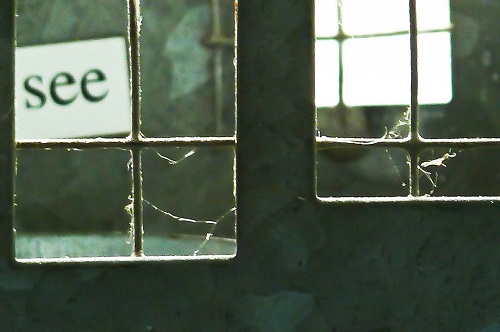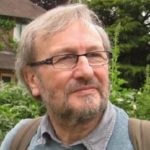Steve Johnson photo
Sanjeev Sethi interviews Michael Bartholomew-Biggs
Michael Bartholomew-Biggs is a mathematician turned poet who has published eight books of poetry.
In my email exchange I noticed his questioning mind, and his hesitancies. Two qualities, I think, help him indite fine poetry. Besides this he curates London Grip, widely respected for the quality of work it publishes. Michael has just published The Man Who Wasn’t Ever Here. We speak to him about this and other things poetic.
Over to the affable Michael Bartholomew-Biggs.
Q: You have just released your eighth book, The Man Who Wasn’t Ever Here (Wayleave Press). How does it feel?
It feels very gratifying because this is a kind of completion of my very first book (Anglicised by Common Use, Waldean Press, 1998) which contained a sequence of around ten poems about my Irish grandfather. Since then I have found out more about his life and written further poems. I was very glad when Mike Barlow at Wayleave Press agreed to republish these early poems (slightly revised) alongside the new ones and bring the whole story into one place. (Although to say “the whole story” seems to assume there won’t be any more revelations about Grandad Thomas!)
Q: Poetry came late to you? What do you think is the reason for this?
My education (and subsequent employment) as a mathematician meant that I did a lot of technical reading and writing; and, while I have always enjoyed novels and some non-fiction books, I had little time to spare for the challenges that poetry seemed to present. Oddly enough though, there was a time in my teens when I became very interested in the poems of T S Eliot; but that did not lead me into any broader exploration. Eventually, in my forties, I was drawn back into reading poetry (and attempting to write it!) by the example of my wife, Lynda, who became involved with a local poetry group – Toddington Poets. Rather presumptuously I thought that if she could write poems then so could I! Fortunately we both received some good and timely advice and encouragement from poets who were much wiser than we were.
Q: Besides writing and editing you’re a mathematician. Mathematics as a form is rigid while poetry is fluid? How do you explain this contradiction?
I don’t think there is that much of a contradiction. Mathematics may sometimes deal with “rigid” assumptions and precise conclusions. But there can be many ways of proceeding from one to the other and it certainly makes sense to talk about style, elegance and economy in the proof of a theorem or in an algorithm to solve a numerical problem. Both poets and mathematicians are often trying to look beyond particular instances to illuminate broader principles. As I observe in my pamphlet Uneasy Relations:
Poets show, don’t tell:
build metaphors from concrete
and specific bricks.
In mathematics,
abstract and general is
our bread and butter.
Q: The religious calling is a poetic concern you have dealt with seriousness in your work? How did this happen?
I have been a Christian since my early twenties (following an obligatory period of aggressive atheism in my teens); and I think it was partly the religious element in T S Eliot’s work (such as Journey of the Magi or A Song for Simeon or The Rock) which helped me to see that poetry could express the mysterious in ways that were harder for analytical prose to accommodate. Very early in my mid-life poetry explorations I came across the work of the Welsh poet-priest R S Thomas which is wonderful in the spare directness with which it confronts the complexities of faith – even to the point of arguing with God and complaining about His seeming absences. Many of my earliest poems were character monologues which put words into the mouths of Biblical characters. Since then the amount of Christian content in my poetry has varied; but it seldom disappears completely. I have, for instance, recently been working on quite a substantial sequence based on the Old Testament Book of Ezekiel.
Q: As an editor of London Grip what do you have to say about the contemporary poetic idiom?
As editor of London Grip I can only comment on the range of poems that contributors choose to send me! For the most part we receive poems which could be described as lyric or narrative pieces using contemporary language and themes and which are in (moderately) free verse. We are not averse to receiving and publishing poems which are mildly experimental; but, in practice, the ones I have seen are so varied that they do not give me sufficient grounds to make a general comment on “contemporary poetic idiom”!
Q: Which part of the word do you think is making significant poetic strides?
I’m afraid I am not equipped to make an informed response to this question! I am very pleased that London Grip receives submissions from many parts of the (English speaking) world. But, as I mention above, this is a self-selecting sample and does not give much insight into the very big question you have asked.
Q: The fact that money plays no role in poetry. Do you think this is a good or a bad thing?
This is an interesting question. It has recently been explained to me – in the context of some lively social media debate about plagiarism in poetry – that, at the level of personal finance, money does play a role for many poets. While I was fortunate to have a separate “day job” as a mathematician, many poets have to rely on their art to make a living – e.g. by teaching on creative writing courses, by running workshops, by taking writer-in-residence posts or by applying for literary grants. So poetic recognition – or lack of it – can have serious personal financial implications.
Of course few poets can expect to make big sums of money from poetry (although a short story ‘Career Move’ by Martin Amis gives a fascinating glimpse of an alternative literary world in which screen writers struggle to get scripts published in small magazines, whilst poets are courted by Hollywood-like publishing conglomerates and fly first-class around the world). This absence of big money might be thought to be “a good thing” insofar as it keeps poetry pure and unsullied (whatever that means); but it could equally well be considered a bad thing because it reflects the fact that (in the Western world at least) poetry is not read or valued by large numbers of people. This is surely a loss to society. Examples such as the War Poets of 1914-18 or the writers whose verses bravely confronted Stalin’s terror regime in the 1930s show that there are times when poetry can both challenge accepted norms and also capture popular attention and imagination.
“Poetry makes nothing happen” is an often-quoted remark from an Auden poem whose validity I won’t debate here. But poetry can surely help to shape and reshape attitudes which in due course will lead to events happening which might not otherwise have happened. It would be very hard to deny that there is ample room for change in some of the prevailing attitudes in Western society. A recent anthology of Greek poetry Austerity Measures (edited by Karen Van Dyck) contains challenging responses to the economic “axioms” which underpin the pain the Greek people have suffered because of the international approach to their country’s debt crisis. In a smaller way, the British anthology Poems for Jeremy Corbyn features poems which address the UK government’s current austerity programme; and there have been a number of publicly angry poetic responses to the Grenfell House fire tragedy in London in summer 2017. More tangibly, marathon poetry events have been successful fund-raisers for causes such as aid for refugees. It is tempting to think that poetry might once again be starting to talk about issues that people want to listen to.
Q: One last question: What is your personal definition of poetry?
As a mathematician I would not attempt to define the indefinable!
Sanjeev Sethi
Sanjeev Sethi is the author of three well-received books of poetry. His most recent collection is This Summer and That Summer (Bloomsbury, 2015). His poems are in venues around the world: Empty Mirror, Olentangy Review, Grey Sparrow Journal, Peacock Journal, Modern Poets Magazine, Faith Hope & Fiction, New Mystics, Yellow Mama, Serving House Journal, The Penwood Review, Boston Accent Lit, Soul-Lit, London Grip, 3:AM Magazine, With Painted Words, and elsewhere. He lives in Mumbai, India.
Michael Bartholomew-Biggs
Michael Bartholomew-Biggs was born in Essex but grew up in Middlesex, near Heathrow Airport. A youthful aptitude for sums and symbolic manipulation caused him to embark on a mathematical career, first in the aircraft industry and then in research & higher education. After publishing two text books and many research papers in the technical literature, he retired from full-time academic life in 2008 and is now Reader Emeritus in Computational Mathematics at the University of Hertfordshire.
He began writing poetry in the late 1980’s and found valuable early encouragement at the Toddington Poetry Society. His work has been widely published in magazines and anthologies and some of his poems can be found on-line at poetry pf and in the Poetry Library archive. His work also appears in online magazines such as Writer’s Hub, Fulcrum, The Bow-Wow Shop, morphrog, Penniless Press, Message in a Bottle and Ink Sweat & Tears and in print magazines including Acumen, Assent, Critical Survey, Envoi, The Frogmore Papers, Interpreter’s House, Other Poetry and The SHOp. He has also been a guest reader at the Torbay and Essex Poetry Festivals.
His first chapbook, Anglicized by Common Use, appeared in 1998. This was followed by Inklings of Complicity (2003) and then by Uneasy Relations (2007) in which he allowed the two halves of his brain to cooperate and produce poems which link mathematical ideas with subjects as diverse as hill-walking, portfolio theory, sexual politics and the works of Edgar Allan Poe.
His first full collection Tell it Like it Might Be (2008) searches for “what really happened” behind familiar stories such as lovers’ protestations, government statements or the Christian gospels. His second book was Tradesman’s Exit (2009) which mixes elegy with personal recollection to test the links between who we are, what we do and how we might be remembered.
His latest full collection Fred & Blossom, published by Shoestring Press in summer 2013, is a narrative sequence set in the world of aviation in the 1920s and 30s. A chapbook Pictures from a Postponed Exhibition was published by Lapwing Press in September 2014. This is an “evolution myth” which features paintings by the Australian artist David Walsh.
Although he still has some involvement with mathematical research, Mike now spends most of his time writing, reviewing and editing. He is poetry editor of the on-line magazine London Grip and, with his wife, the poet Nancy Mattson, he helps to run the Poetry in the Crypt reading series at St Mary’s Church in Islington.




No Comments Yet!
You can be first to comment this post!